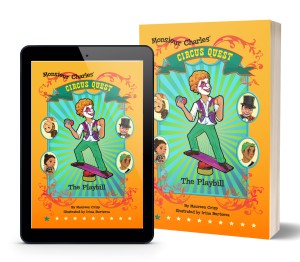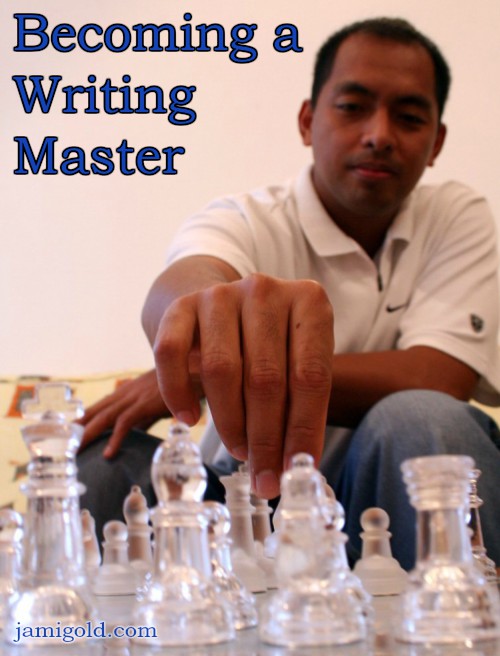Like with many skills, writing requires practice. We might have even heard the saying that we won’t be any good until we write a million words for that “practice.”
Is that claim true? Is a million words the key to getting in the practice that we need to be good at writing?
Or is there a smarter way to practice that will help us more quickly master the skills of writing? Maybe even before we pound out those million words. *grin*
Maureen Crisp, a favorite person of mine for her weekly roundup of links to writing tips and articles, is helping me out during NaNoWriMo month with her insights. As a judge for a major book award with entries from both debut and veteran authors, she knows the facts on whether it really takes a million words to be a writing master.
Please welcome Maureen Crisp! *smile*
*****
Apprentice or Master
by Maureen Crisp
It has been said that writing the first million words are practice for the serious writer. This got me thinking: Have I written a million words?
Do we count the carefully crafted email replies that take twenty-five minutes to write six sentences? Blog posts? All your novel attempts? All the words you have ever deleted from your novel in progress?
After I had been thinking about this for a while, I looked at the boxes filled with books all around my house. I have been reading a lot of books over the last six months as one of the judges for the New Zealand Book Awards for Children and Young Adults.
Our long-established writers, the ones that you know have deleted millions of words for every million published, seem to write effortlessly. Their words flow so well that you don’t read the story — you inhale the words as you are breathing.
What Does Writing Mastery Look Like?
At this level, experience shows. Nothing gets in the way of the reader, or judge in my case, completely living inside the author’s head.
What does it take to reach writing mastery? @craicer shares her insights... Click To TweetI am not being jolted out of the book by clunky sentences, poor grammar, and the writer getting in the way of the plot. Stories with no emotional arc, caricatures instead of characters, makes a forgettable story.
Spending the first three pages describing the dark and stormy night bores the reader. An adult reader may give a new book a chapter or two to see if they like it. Children and teenagers, two pages — tops.
What Writing Contests Can Teach Us about Mastery
As a judge for the New Zealand Book Awards for Children and Young Adults, we have to evaluate all books submitted across all the age groups from Preschool to Young Adult, Fiction and Non Fiction. Books that stood out were the ones that made me forget I was reading.
How often have you lost hours of time reading a book and not noticed it? A twist or reveal that grabbed me and made me think about the world differently went to the top of the pile quickly regardless of age group or genre.
Outstanding books made the list of every judge, who all had very different tastes and backgrounds. The shortlists were then read several times. The winners of each category stood out because even on the tenth reading, they had something to offer.
Can We Write an Outstanding Book without a Million Words?
So what makes an outstanding book? Has the author written one million words?
Not necessarily. Some of our outstanding books came from debut writers.
In talking with these outstanding writers later, I discovered that they all had something in common. They challenged themselves to improve one aspect of the craft with every book project.
Our Challenge: Continuous Improvement
They pick an area to focus on and then read all the craft textbooks on that subject. Their challenges could be to master point of view or voice or theme or plot structure. Improving grammar or narrative style or word play is on their must-learn list.
These writers continually work at their craft. They identify their weak points and work hard to master them. This attitude to the craft of writing lifts writers from the large pool of good to the small pool of great and into the even smaller pool of outstanding.
Ever hear that the first million words are practice? @craicer's tips to speed up our learning curve... Click To TweetEven in our shortest length books, experience and attention to the craft of writing shows. In the children’s book world, an award winning picture book can take years to craft. “The shorter the word count the harder to write” is a common saying in our genre.
Experienced children’s book writers attend master classes with other experts to add to their knowledge. They switch formats, novels to picture book or genres, mysteries to non-fiction to keep their writing fresh. They devour poetry and they continually learn.
These writers have leveled up because they don’t let themselves stop learning after writing their one millionth word. They see themselves as always a story apprentice. Others see them as masters of their craft.
6 Ways We Can Level Up Our Writing
Here are some ways to level up in your own writing. If you do some or all of these, every year, you will be taking the fast elevator up the word mountain to swim in the outstanding pool.
#1: Learn the Possibilities of Your Genre:
Read all the shortlisted books in a major award in your genre. Take notes. How have the writers stretched the genre?
#2: Study Options for You to Grow in Your Genre:
Read at least five best sellers in your genre. Take notes of what grabs you as a reader? …what challenges you as a writer?
#3: Focus on an Area of Growth:
Identify a weakness in your writing. Your beta readers might help you out here. Study to master it. Then move on to another weakness.
#4: Learn Something New:
Commit to learning something new with each book project. It could be seamless info dumping or antagonist motivation or any topic from the index of your favorite craft book.
#5: Learn Marketing Skills:
Study an aspect of book marketing, cover tropes, or copywriting, blurbs, and synopsis writing. It is all craft knowledge and will help you to hook readers because you want your outstanding book to sell don’t you?
#6: Never Stop Learning:
Be open to learning more about the craft of writing as you add to your million word total. After all, this is your career and you are working towards mastery. (Mastery = a higher form of apprenticeship. LOL.)
You may just surprise yourself with an award winner tag on your book cover next to the bestseller ribbon.
*****
 Maureen Crisp is a primary school teacher by trade and a geek by inclination. She writes a mix of contemporary and science fiction stories to disguise the fact that she is overly fascinated by Mars, the robot landers, space exploration and juggling.
Maureen Crisp is a primary school teacher by trade and a geek by inclination. She writes a mix of contemporary and science fiction stories to disguise the fact that she is overly fascinated by Mars, the robot landers, space exploration and juggling.
She lives in New Zealand and loves writing for children. She has just launched the first two books in her Circus Quest Series, an exciting series of adventures in a traveling circus.
Maureen’s weekly blog roundup on international publishing news along with writing and marketing tips for authors has been a must read in the New Zealand writing community for over eleven years. In 2017 her peers awarded her the Storylines Betty Gilderdale Award for outstanding services to Children’s Literature in New Zealand. In 2018 she was selected as a judge for the New Zealand Book Awards for Children and Young Adults.
Find her online at:
Weekly Writing Blog Roundup | Author Website | Twitter
*****
About the Circus Quest Series:
 The mysterious Puzzle Master has invited Circus Charles to once again compete to find the best circus in the world. But not everyone wants them to win. Will they be stopped like last time?
The mysterious Puzzle Master has invited Circus Charles to once again compete to find the best circus in the world. But not everyone wants them to win. Will they be stopped like last time?
The Circus Quest series takes readers behind the scenes in a traveling circus. There are ten books in the series with codes to work out inside and on the covers of each book.
Ideal for the beginning confident reader. With big font, black and white illustrations throughout, slapstick humour and circus stunts vetted by real circus instructors, this is the perfect series to recommend to parents of quirky, confident young readers. Book One and Two is out now.
Print: Amazon | Book Depository | NZ Retailers
Ebook: Amazon | Kobo | Apple
*****
Thank you, Maureen! I love the questions you asked at the beginning of your post about what counts for that “million words” goal because I wondered the same things when figuring if I’d hit that million mark or not yet. But as you pointed out, while that saying might be common, the issue of mastery isn’t quite that simple.
I even wrote before about how we can be advanced in some respects and a beginner in others. The learning curve never really ends, as we can always learn new skills or work to improve existing skills. In fact, I created my big writing craft skills lists for story development, line editing, and copy editing so we’d have a “master list” of options for our focus and practice.
But we also have to keep in mind that, as Maureen alluded to, “practice” isn’t automatically helpful. In fact, if we practice bad habits, we’re just more likely to make them further ingrained rather than improve into better habits.
Instead, we want our practice to be productive—actually teaching and expanding our skills. With the right kind of practice, we might not need a million words before our writing isn’t crap. And with Maureen’s tips, hopefully, we can make our practice as effective as possible. *smile*
Have you heard the saying about how the first million words are practice? Do you think it’s true? (And if so, what counts? What doesn’t?) Do you figure you’ve passed the million-word mark, and if so, does the saying hold true for your experience? Do you consider writing to be a never-ending learning experience, like an apprenticeship rather than something you master? Do you have any questions for Maureen?

